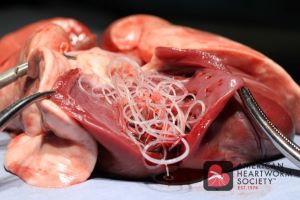Testing for Heartworm Resistance
Canine heartworm disease has been diagnosed in all 48 states of the contiguous U.S. It is caused by infestation with the parasite Dirofilaria immitis and spread through the bite of a mosquito. Once injected into the dog host, heartworm larvae mature in the blood stream and eventually establish residence in the heart and large blood vessels as 6 to 12-inch adult worms. These worms and the associated inflammation prevent normal function of the cardiovascular system and result in clinical signs such as cough, fatigue, decreased appetite, and reluctance to exercise. In advanced cases, heartworms can cause heart failure and cardiovascular collapse.

The cardiovascular damage caused by heartworms is irreversible. Therefore, management of this disease has relied heavily on prevention with the use of antiparasitic drugs known as macrocyclic lactones. These drugs prevent the larval heartworms from maturing into adult worms. Low doses given at regular intervals have been very safe and effective at preventing heartworm disease in dogs for decades. Recently there have been increasing clinical reports and laboratory confirmation that some heartworms are resistant to these preventive medications – a definite threat to canine health.
There is no reliable test for heartworm resistance to currently used preventives. Without such a test, we don’t know how many heartworms are resistant to macrocyclic lactones. How common is this problem? Veterinarians also need a test to help treat heartworm disease in their individual canine patients. Are the heartworms affecting this particular dog resistant to common preventive medications? With funding from AKC Canine Health Foundation (CHF) grant 02458-A: A Laboratory Test for Detecting Drug Resistance in Canine Heartworm Disease, investigators at Iowa State University evaluated various tests that could help distinguish susceptible and resistant heartworms and recently published their results.
Investigators ran tests of cell membrane permeability, metabolic activity, and enzyme activity which could easily be run on a blood sample collected in the veterinary clinic. They tested four different heartworm populations – two known to be resistant and two known to be susceptible to macrocyclic lactones. Their goal was to determine if any of these tests could accurately identify resistant heartworms. While each of the heartworm populations studied showed some unique characteristics in their test results, none of the tests clearly predicted susceptible or resistant behavior.
While no obvious test for heartworm resistance resulted from this research, valuable information was obtained. Future studies on heartworm resistance must include multiple populations of the parasite. Because the heartworm populations examined in this study varied in their biochemical processes, we cannot assume that the mechanisms of resistance are the same in all heartworms. Investigators did find variations in the locations and types of metabolic enzymes present in heartworms. A more detailed look at their different functions might reveal clues for testing and management of resistance.
The AKC Canine Health Foundation and its donors remain committed to addressing the ongoing threat of heartworm disease and heartworm resistance to currently used preventatives. Veterinarians and dog owners need new tools and strategies to combat this common and deadly parasite. In a novel approach to managing canine heartworm disease, CHF-funded investigators at Texas A&M University are studying mosquitoes that spread this parasite (CHF grant 02821-A: Investigating the Role of Aedes aegypti in Dog Heartworm Transmission in Communities along the U.S.-Mexico Border). Results could identify if and how mosquito control can impact the prevalence of canine heartworm disease.
Dog owners should follow their veterinarian’s recommendations for regular heartworm testing and prevention. Learn more about CHF-funded research on this and other canine health threats at akcchf.org/research.
Related Articles
- Sniffing Out Strategies to Control Chagas Disease (04/18/2023)
- The Canine Immune Response to Valley Fever (03/20/2023)
- Chagas Disease Risk for Dogs in a Kennel Environment (08/10/2021)
Help Future Generations of Dogs
Participate in canine health research by providing samples or by enrolling in a clinical trial. Samples are needed from healthy dogs and dogs affected by specific diseases.



